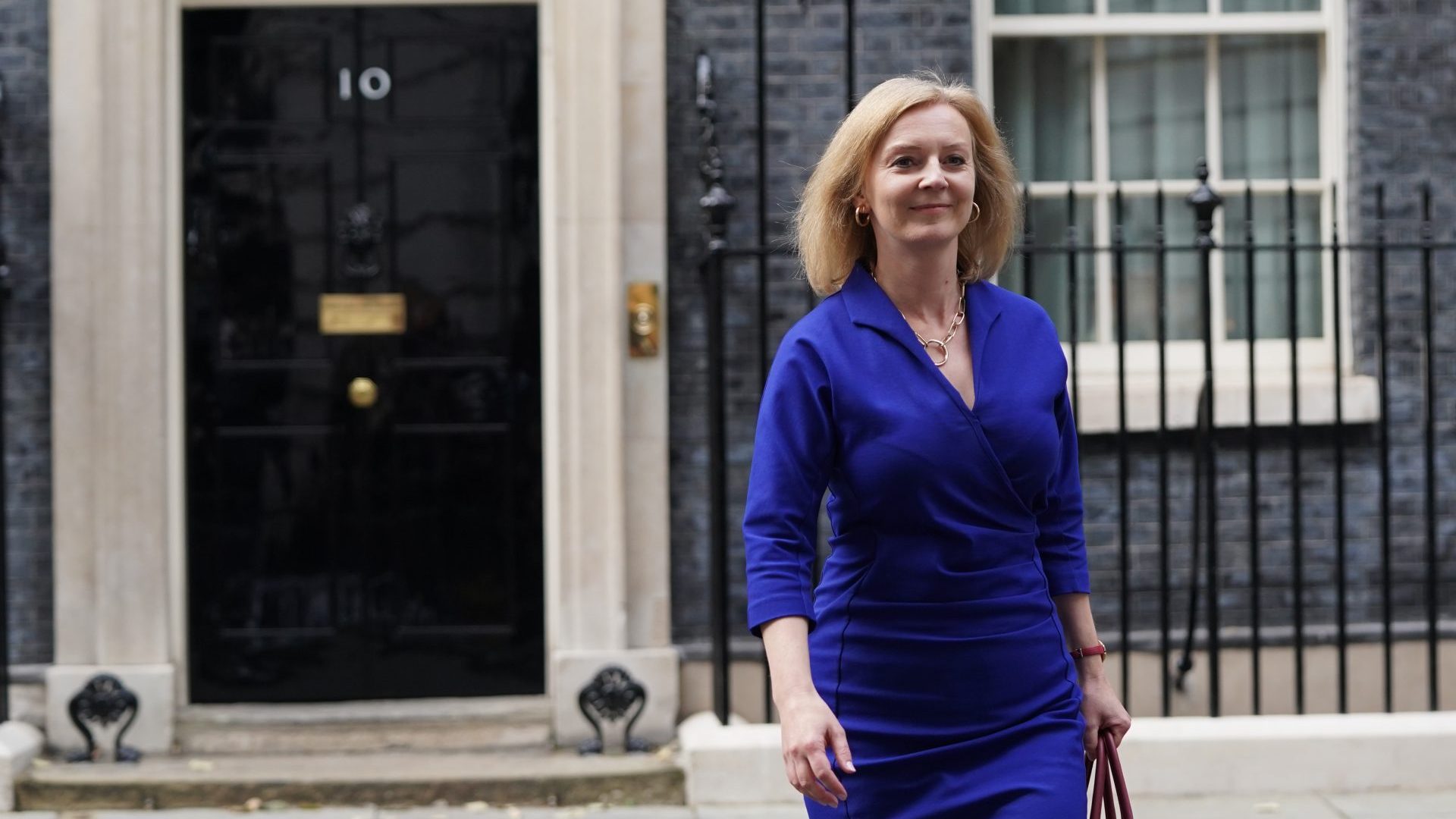Quiz question: where could you have seen this headline last week: “Liz Truss is like a driver who crashes at 100mph… then blames the passengers in the back”?
Obviously not the Sunday Telegraph, where Ms Truss announced her political comeback in a 4,000-word non-mea culpa in which she declared that during her disastrous spell as prime minister, she had had all the right ideas all along but everyone else had spoiled her party.
Was it in the Guardian? The Mirror? the i? Not even warm. Try the Daily Mail. Yes, that Daily Mail, the one that once hailed Truss’s catastrophic economic revolution as “At last! A true Tory budget”.
It doesn’t seem so keen on her these days. Now it reports that her “unfunded £45bn tax cuts panicked the markets and tanked the pound” – not quite the language it used to describe the response to the budget at the time – and gives space to critics describing her as delusional and Tory MPs who say they would prefer to forget her time in office.
It has also allowed Dominic Lawson to put the boot in on the op-ed, and to claim that he had predicted last July that it would all end in disaster.
He did, sort of. Early in the last-but-one Tory leadership campaign, Lawson recalled with pride the day in 1988 when his father Nigel had slashed the top rate of tax from 60 to 40 per cent, before looking askance at the current candidates hoping to emulate him. Promising tax cuts was all very well, he wrote, but the right conditions had to be in place first. Rishi Sunak had grasped this in prioritising tackling inflation and controlling spending; the other hopefuls were a bit too free with their promises.
Looking back, it was quite the piece – a virtual endorsement of Sunak, counter to the thrust of everything the paper was running at the time, which was that the former chancellor was too pessimistic, too cautious. Truss had the right ideas. She was the one.
That was the last we heard from Mr Lawson on the leadership (in the Mail at least) – other than the obligatory swipe at Penny Mordaunt – until the dying days of the Truss experience, when he wrote that a real Thatcherite would never have been so reckless.
For from the day Boris Johnson resigned almost to the day Truss gave up the ghost, the Mail had bet the house on Liz. It had little time – or space – for columnists questioning her suitability or her strategy. Especially those who thought Sunak would do a better job.
The Mail was furious with Tory MPs for ejecting Johnson and was in no doubt that Sunak was the villain – for it was his resignation that removed the bung from the dyke, triggering the deluge of resignations that swept Johnson from office.
It mattered not that Johnson was ousted on a matter of integrity; because his ministers were not prepared to carry on lying for him. For the Mail – which disliked his “race” to net zero, his green taxes, his lockdown strategy, his social care levy, his borrowing and his spending – he was a winner with a huge public mandate and that was what counted. Everyone knew his faults, but these should be overlooked in the interests of the bigger picture.
He had been the victim of an outbreak of collective hysteria among Tory MPs, driven by enemies (the Left, embittered Remainers, the BBC, the wokerati) who had concocted a mountain out of a molehill of trivial misdemeanours. Trivialities such as the lockdown drinking culture in Downing Street (including a raucous party on the night before the Duke of Edinburgh’s funeral), which is now written off by the Mail as “a birthday cake that never came out of its Tupperware box”.
(All of this is still the subject of a parliamentary standards inquiry, which the Mail describes as a witch-hunt, a kangaroo court that should be disbanded because its verdict is a foregone conclusion that cannot help but be tainted.)
He had been dethroned, defenestrated, brought down in a moment of regicidal lunacy by political pygmies who had more weapons than the killers on the Orient Express: knives, blades, daggers, swords, rapiers, stilettos and axes were all “plunged” into the great man’s back. He was even served hemlock.
Still, what was done was done and, with the occasional wistful backward glance, the paper set about making sure it got the person it wanted in Downing Street. And that person was Liz Truss.
Over that long, mad summer, the paper promoted and projected her as a strong leader-in-waiting, just as it had done with ‘strong and stable, crush the saboteurs’ Theresa May during the Brexit traumas of the last decade. It mustered all the might of its often vitriol-dipped pen to secure Truss’s election, exaggerating her qualifications for the job way beyond anything discernible to the casual onlooker – had it never seen the cheese and pork market videos? – and rubbishing her biggest rivals.
First it set out to destroy the main threat to her place on the final ballot paper – Penny Mordaunt –and then to denigrate Sunak (although it was punctilious in crediting him for measures he took to keep businesses afloat during the pandemic – after all, he might win and the Mail would then have to sell him to the country).
In truth, the Mail had never been a big fan of Sunak, particularly after his National Insurance increase, which was introduced (though the paper tends not to mention this) to fulfil Johnson’s ambition to “fix social care”.
It didn’t think the public were big fans either. And the overriding priority of its coverage of the Tory party shenanigans was electability. Leading articles invoked “struggling families”, but people were more often described as “voters”, with concern about them more focused on how they might punish the Tories at the ballot box than on how policies were affecting their lives. The greatest fear was that the Conservatives would be “consigned to oblivion”, of Starmer the socialist being allowed anywhere near power. And so Tory MPs were hectored about the importance of unity and of getting behind their leader.
The ‘Left’ (which later metamorphosed into Truss’s “anti-growth coalition”) had grown into a monstrous threat that included not only the official opposition, Nicola Sturgeon, the Civil Service and the BBC, but half the Tory party as well. The appointment of Jeremy Hunt and Grant Shapps to replace Kwasi Kwarteng and Suella Braverman after the mini-Budget imploded was a “liberal left coup”. Sunak, a committed Brexiteer who is happy to send asylum-seekers to Rwanda, was not right wing enough for Ted Verity and Paul Dacre.
To keep Sunak out of No 10, they did all they could to portray Truss as the country’s saviour. There were hundreds of news pages and dozens of editorials and opinion columns, most of which emphasised her perceived strengths and his perceived weaknesses. She was also given three guest columns and two interviews, all of which produced lead stories for the paper. Sunak had the one – at the bottom of an inside spread, with no signposting from the front.
When Truss was declared the winner, the paper was delighted – “Cometh the hour, cometh the woman” – and predicted in a leader “the Tory fightback starts today”. It was even more delighted when she wasted no time in getting her friend Kwasi Kwarteng to announce the tax cuts she had promised throughout the campaign – the ones Sunak had repeatedly denounced as fairytale economics. Trussonomics was going to cast aside the “grinding Treasury orthodoxy”, turbo-charge growth and jolt the economy out of the doldrums after two decades of stagnation. (The Conservatives had been in power for 12 of those years and the Mail was still mourning the ending of the partnership that had most recently overseen that sclerotic, sluggish, struggling, stagnating economy: Johnson and Sunak. If the paper had had its way, they would still have been running it.)
When the sky fell in, the Mail – which prizes loyalty above almost any other quality – stuck with Truss through thin and thinner. The markets were rabidly over-reacting. The Bank of England was to blame, City slickers were to blame, the IMF was to blame, Putin was to blame.
Editorials focused on the need for unity, on Tory MPs’ “duty” to get behind the prime minister. Many pints were drunk in many last-chance saloons, “witless” MPs were Gadarene swine or turkeys voting for Christmas, peeling the spuds and putting themselves in the oven.
One by one, columnists from Andrew Neil and Sarah Vine to Stephen Glover and Richard Littlejohn, expressed growing qualms about Truss. But only in her administration’s death throes did the paper itself criticise her, and then for her bungled presentation, not the policies. Only at the bitter end did it desert her.
And when it did, boy did it desert her. Eleven weeks after its front-page endorsement of the woman “blessed with Yorkshire grit” who had the “boldness, imagination and strength of conviction to build on what Boris began”, its leader writers gathered a different clutch of adjectives from their colourful lexicon to describe her. She was “hopelessly out of her depth”; a “lethal combination” of “incompetence, unforced errors, self-delusion, untethered ambition and hubris”. She had turned the party of Churchill and Thatcher into a laughing stock.
Just 44 days after that ‘historic special edition’, the Mail was hailing another “new dawn for Britain” with the arrival of Sunak in No 10. The fightback was again going to “start here”.
Having switched horses then, the Mail seems in no hurry to switch back now that Ms Truss has resurfaced to stir the stew. Even though it hasn’t changed its mind on the economy. It may have repudiated Truss, but it is still pushing for tax cuts and an emphasis on growth.
In giving Truss a platform, Sunday Telegraph editor Allister Heath stayed true to his economic instincts. He, too, had been thrilled by the Kwarteng package, describing it as the greatest budget he had ever seen; the “hysterical” reaction to it had been “ignorant”; Truss should hold her nerve.
The Mail thought all these things too – at the time. But with Truss’s reappearance it had to make a decision on which was more important: the Tory party or the economy (or at least its view of what is best for the economy). As ever, the party triumphed.
When Johnson quit, the Conservatives were some ten points behind Labour in the polls. The Mail was convinced that Labour could never win an overall majority, but it feared that Sir Keir Starmer could “cobble together” a “coalition of chaos” with the SNP, Liberal Democrats and the Greens that might keep the Tories out of office forever. By the time Truss resigned, Labour was 37 points ahead and in a position to wipe out the Conservatives with no need for coalitions or apparent risk of having to run a minority administration.
It’s not quite so bad now, but it’s still dire. The last thing the Mail wants is more party infighting. It has dumped Truss and won’t go back to her. It has conveniently forgotten that it was right alongside her, urging her to put her foot on the gas when those passengers in the back were crying “slow down”. The Mail will stick with Rishi for the time being, but it will be on his case.
It’s still dreaming of Boris.
Liz Gerard is former night editor of the Times and a blogger on media issues. Her book Trussed Up – How the Mail tied itself in knots over the Tory leadership is available here.












